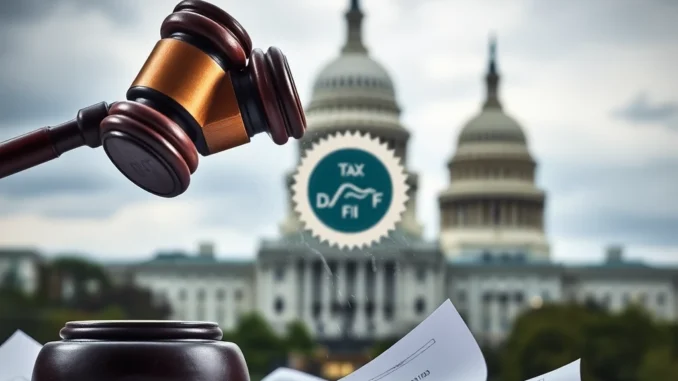
Get ready for a potentially seismic shift in the crypto landscape! Today, the U.S. House of Representatives is poised to vote on a resolution that could overturn the controversial IRS DeFi broker rule. Following hot on the heels of a strong Senate vote last week, this move could signal a major win for the decentralized finance (DeFi) sector and crypto investors alike. Is this the breakthrough the crypto industry has been waiting for regarding DeFi regulation? Let’s dive into what’s happening and why it matters.
Why is the IRS DeFi Broker Rule Causing Such a Stir?
The IRS DeFi broker rule, in essence, mandates that brokers within the decentralized finance space report gross proceeds from digital asset sales. Sounds simple enough, right? Wrong. The crypto industry has voiced significant concerns, arguing that this rule is:
- Vague and Overbroad: The definition of a ‘broker’ in the DeFi context is unclear, potentially capturing not just centralized exchanges but also decentralized protocols, developers, and even users interacting with DeFi platforms.
- Technically Unfeasible: DeFi is built on decentralization and often anonymity. Imposing traditional broker reporting requirements on these systems is like trying to fit a square peg in a round hole. How can a decentralized protocol, with no central authority, comply with IRS reporting?
- Innovation Stifling: The burdensome reporting requirements could push innovation and development in DeFi overseas, hindering the U.S.’s position in this burgeoning technological field.

US House Vote: A Potential Turning Point for Crypto?
The upcoming US House vote is not just another procedural step; it’s a critical juncture. The fact that the Senate already passed a resolution to repeal the rule with a resounding 70-27 vote speaks volumes. This bipartisan support suggests a growing understanding in Washington of the unique challenges and potential of the crypto industry.
What does a successful House vote mean?
- Repeal of the Rule: If the House votes in favor, the resolution to repeal the IRS DeFi broker rule will be sent to the President. While the President’s stance is crucial, the strong bipartisan support suggests a high likelihood of the repeal being enacted.
- Reduced Regulatory Burden: For the DeFi sector, this would mean a significant reduction in the immediate regulatory pressure, allowing for continued innovation and growth without the fear of overly burdensome reporting requirements.
- Positive Market Sentiment: A successful repeal could inject positive sentiment into the crypto market, signaling a more favorable regulatory environment in the U.S., which could attract further investment and development.
The Broader Picture: Cryptocurrency Tax and DeFi
This vote is happening within a larger conversation around cryptocurrency tax policy. Governments worldwide are grappling with how to regulate and tax digital assets. The DeFi sector, with its decentralized and often borderless nature, presents unique challenges to traditional tax frameworks.
Challenges in Cryptocurrency Tax Compliance:
| Challenge | Description |
|---|---|
| Decentralization | Identifying taxable events and responsible parties in decentralized systems is complex. |
| Cross-border Transactions | Crypto transactions often cross jurisdictional boundaries, making tax enforcement challenging. |
| Valuation | Determining the fair market value of crypto assets for tax purposes can be volatile and subjective. |
| Evolving Technology | The rapid pace of innovation in crypto and DeFi constantly presents new tax challenges. |
Looking Ahead: The Future of DeFi Tax Reporting
Even if the IRS DeFi broker rule is repealed, the need for clear and sensible DeFi tax reporting guidelines remains. The industry and regulators need to work together to develop frameworks that are both effective in ensuring tax compliance and conducive to innovation. What could a better approach look like?
- Clarity and Specificity: Future regulations need to clearly define terms like ‘broker’ in the DeFi context and provide specific guidance on reporting requirements.
- Technology-Neutral Approach: Regulations should be technology-neutral, focusing on the economic substance of transactions rather than specific technological implementations.
- Industry Collaboration: Ongoing dialogue and collaboration between regulators and the crypto industry are crucial to developing practical and effective tax policies.
Actionable Insight: Stay Informed and Engaged
The US House vote today is a significant event. Whether you’re a DeFi user, investor, or simply interested in the future of crypto, staying informed is crucial. Follow news updates, engage in discussions, and consider contacting your representatives to voice your opinion on sensible crypto regulation.
Conclusion: A Pivotal Moment for DeFi and Crypto Regulation
Today’s US House vote on repealing the IRS DeFi broker rule represents a pivotal moment for the DeFi sector and the broader crypto industry. A successful repeal would not only alleviate immediate regulatory pressure but also signal a potentially more constructive approach to crypto regulation in the United States. Keep your eyes peeled on the news today – the outcome of this vote could have far-reaching consequences for the future of decentralized finance and cryptocurrency tax policy. This is a space to watch closely!



